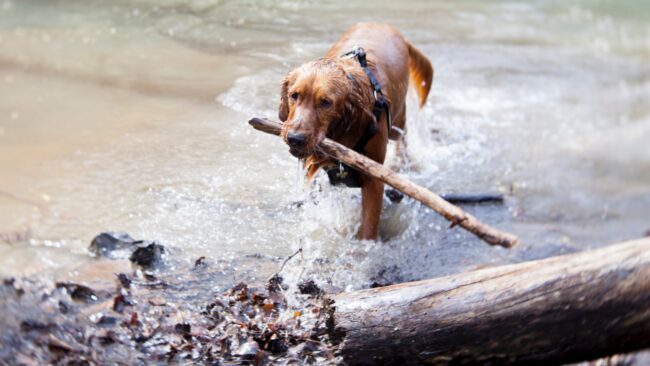Table of Contents
Bully sticks are one of the most popular treat options among dogs and their owners. They are stress-reducing chews known to boost your pet’s oral health and kill its boredom. However, a common concern among pet owners is whether bully sticks are safe for dogs. A lot of people ask if they can cause stomach problems, including diarrhea.
While you may be aware of the several health benefits of these tasty delights, it is equally important to understand their safety and risks before giving bully sticks to your beloved pet.
Do Bully Sticks Cause Diarrhea? A Complete Guide
One of the biggest reasons dog owners get attracted to bully sticks is that they give the pups a good amount of chewing time to benefit their oral health. Chewing on these treats also reduces anxiety and improves mental stimulation. They are bull pizzles made out of beef muscle and available in several variations to choose from.
Bully sticks have got a bad reputation for affecting dog stomachs adversely. If you are looking to give your dog one of these treats a try, a simple Google search would bring up several anecdotes about bully sticks and diarrhea. However, this does not mean your dog will get diarrhea when given these treats. It is difficult to confirm whether these anecdotes are accurate or false.
So, do bully sticks cause diarrhea? The simple answer is – Yes, in some cases. First, you should remember that every dog is different and reacts differently to foods. There are some dogs who are sensitive to certain food items. If you are unsure whether bully sticks would cause diarrhea to your pet, it is important to take some measures to introduce them safely to avoid any adverse reaction.
Do Bully Sticks Upset Stomach?
Bully sticks are a high protein treat, and dogs are generally not accustomed to digesting so much protein. This can sometimes lead to an upset stomach with symptoms like diarrhea, nausea, and vomiting. However, this does not mean bully sticks would always cause stomach problems. There is a way owners can prevent such issues from happening.
With a slow introduction to the treat, pet parents can reduce the risk of upsetting the pup’s stomach and avoid other problems. When you give your pet bully sticks for the first time, make sure you select the right shape and size and treat for a few minutes initially. Keep a close watch on the reaction and behavior of the dog to make sure there is no abnormal consequence. You can gradually increase the chew time if the dog has no adverse reaction.
If your pet starts behaving strangely, you should consult a vet at the earliest and get to the underlying problem. You should give no more than one bully stick to your dog every day to lower the risk of an upset stomach.
Common Bully Stick Stomach Problems
Bully sticks are often criticized for being contaminated with bacteria. Like any other food or pet treat, a bully stick not properly made or stored can be contaminated and cause diarrhea and other stomach problems when fed.
Bully sticks are popular among pet owners because they are natural and minimally processed. The more processed a food is, the lesser the chances of contamination. This means these treats have a high possibility of having different forms of bacteria on them. Ensure you buy bully sticks from reputed sellers and store them properly to avoid such a problem.
So, while it is true that bully sticks can cause diarrhea and other stomach issues in dogs, it ultimately comes down to several factors. Here is what you can do to ensure you safely give these treats to your pet.
Monitor behavior – If your furry friend is new to bully sticks, introduce them in small quantities and watch them closely to ensure it is not particularly sensitive or allergic to protein or the product. If your pet is allergic to protein, you should check with your vet before trying this treat.
Avoid overfeeding – Remember not to substitute the dog’s meal with these treats. Bull pizzles should be consumed in moderation as they are high in protein. Overfeeding your pet is likely to upset its stomach.
Feed safely – Practice safe handling of these sticks to avoid accidentally contaminating the treat. Read the labels to understand how to store and serve the treat and wash your hands before handling them. Regardless of what treat or food you are serving, neglecting safety is a surefire way to make your pet sick sooner or later.
Other Bully Stick Side Effects
Bully sticks are treats that any dog will love chewing on for hours. However, they are high in calories, with a small stick contributing up to 90 calories. This means they can make up much of the dog’s daily calorie intake. They are not suitable for a daily treat and should be given only on special occasions and not more than 1-2 sticks a week. They are also not appropriate for obese or overweight dogs.
While most dogs tolerate the sticks well, some pets may show intolerance and report stomach issues like diarrhea. They are too rich to get easily digested and may need some trials to get your pet used to them. Some owners may not like giving several diarrhea incidents to help the pets develop tolerance to these treats.
Bully sticks generally have a bad odor as they are natural, unprocessed beef muscles, so you may want to leave them outside. However, some manufacturers produce odor-free sticks which are more processed with chemicals and are well-tolerated as well.
These sticks are durable but likely to break into small pieces if chewed on for a long time. If the dog swallows a big piece of the stick, it can suffer from a choking hazard. Digesting should not be a problem, but it could cause intestinal or throat blockage and lead to serious choking incidents. Always stay closer to your pet to see that it does not swallow a large piece.
Conclusion
Bully sticks are treats your pet is sure to love, and if you can administer them safely, they also provide many benefits. However, it is important to introduce the treats with caution and take proper measures to ensure your furry friend does not suffer from any side effects or health concerns.
We hope this guide gives you an idea of the connection between bully sticks and diarrhea and helps you understand how your pet can enjoy the treats without feeling any stomach pain.

